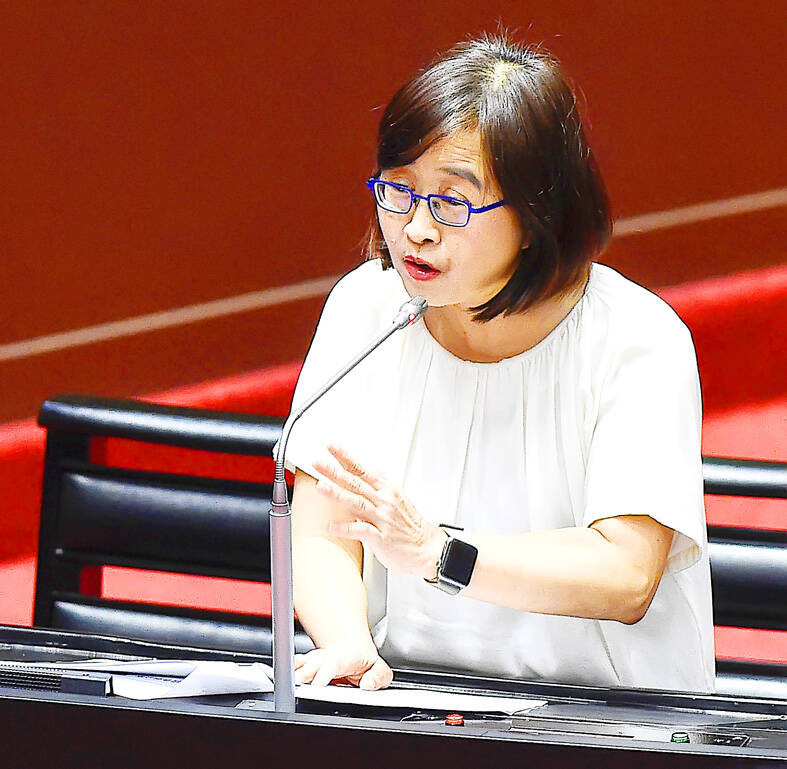Politicians from across party lines yesterday questioned a decision to allow Legislator Lin Yi-hua (林奕華) of the Chinese Nationalist Party (KMT) to delay taking up her role as Taipei deputy mayor until February, which would avoid a by-election for her legislative seat.
Chiang Wan-an (蔣萬安), who is to start as Taipei mayor today, on Friday said that Lin, his election campaign manager, would be one of his deputy mayors, as she is familiar with the municipal administration.
Lin in a news release on Friday said that she has several important issues to handle in this legislative session, so she cannot immediately resign as a lawmaker.

Photo: Chen Chih-chu, Taipei Times
However, Chiang has approved her request to report for duty in February, she said.
Asked if Lin’s late arrival might affect the city government’s operations, Chiang said that former Kaohsiung deputy mayor Lee Ssu-chuan (李四川), his other deputy, has a lot of experience, so his new administration should run smoothly.
However, if Lin resigns as a lawmaker in February, the Civil Servants Election and Recall Act (公職人員選罷法) stipulates that her empty seat would not need to be filled immediately, as there would be less than one year remaining in her term.
Citing Citizen Congress Watch, KMT spokeswoman Chiang I-chen (江怡臻) yesterday said that a legislative by-election on average costs the central government about NT$16 million (US$520,969), so Chiang’s arrangement for Lin would avoid a public disturbance and save taxpayers’ money.
However, DPP member Yen Juo-fang (顏若芳), who is to take her seat as a Taipei city councilor today, wrote on Facebook that the KMT is scrambling for power and profit.
The actions of Lin and Taipei City Councilor Wang Hung-wei (王鴻薇) — who was re-elected on Nov. 26, but is now running in a legislative by-election in Taipei on Jan. 8 — mean that Taipei will be without a deputy mayor for a month and a Daan District (大安) legislator for a year, Yen wrote.
The KMT is abandoning people because it craves power, she wrote, adding that it appears that the KMT’s promises to voters are mere slogans.
Taipei City Councilor Chung Pei-chun (鍾沛君) of the KMT on Friday told a political talk show that Chiang’s team originally planned to let Lee lead the city’s departments while Lin completed her legislative term.
That would have been a better arrangement, Chung said.
Taipei City Councilor Chin Huei-chu (秦慧珠) of the KMT yesterday said that many city residents and city councilors in the party are opposed to the February arrangement.
Their plan would “take points off” the KMT and Chiang, as it might be seen as an arrogant move, Chin said.
Lin should immediately resign and take on the deputy mayor role for the good of the KMT, she said.

Taiwan is stepping up plans to create self-sufficient supply chains for combat drones and increase foreign orders from the US to counter China’s numerical superiority, a defense official said on Saturday. Commenting on condition of anonymity, the official said the nation’s armed forces are in agreement with US Admiral Samuel Paparo’s assessment that Taiwan’s military must be prepared to turn the nation’s waters into a “hellscape” for the Chinese People’s Liberation Army (PLA). Paparo, the commander of the US Indo-Pacific Command, reiterated the concept during a Congressional hearing in Washington on Wednesday. He first coined the term in a security conference last

Prosecutors today declined to say who was questioned regarding alleged forgery on petitions to recall Democratic Progressive Party (DPP) legislators, after Chinese-language media earlier reported that members of the Chinese Nationalist Party (KMT) Youth League were brought in for questioning. The Ministry of Justice Investigation Bureau confirmed that two people had been questioned, but did not disclose any further information about the ongoing investigation. KMT Youth League members Lee Hsiao-liang (李孝亮) and Liu Szu-yin (劉思吟) — who are leading the effort to recall DPP caucus chief executive Rosalia Wu (吳思瑤) and Legislator Wu Pei-yi (吳沛憶) — both posted on Facebook saying: “I

Sung Chien-liang (宋建樑), who led efforts to recall Democratic Progressive Party (DPP) Legislator Lee Kun-cheng (李坤城), was released on bail of NT$80,000 today amid outcry over his decision to wear a Nazi armband to questioning the night before. Sung arrived at the New Taipei District Prosecutors’ Office for questioning in a recall petition forgery case last night wearing a red armband bearing a swastika, carrying a copy of Adolf Hitler’s Mein Kampf and giving a Nazi salute. Sung left the building at 1:15am without the armband and covering the book with his coat. Lee said today that this is a serious

The Ministry of Economic Affairs has fined Taobao NT$1.2 million (US$36,912) for advertisements that exceed its approved business scope, requiring the Chinese e-commerce platform to make corrections in the first half of this year or its license may be revoked. Lawmakers have called for stricter enforcement of Chinese e-commerce platforms and measures to prevent China from laundering its goods through Taiwan in response to US President Donald Trump’s heavy tariffs on China. The Legislative Yuan’s Finance Committee met today to discuss policies to prevent China from dumping goods in Taiwan, inviting government agencies to report. Democratic Progressive Party Legislator Kuo Kuo-wen (郭國文) said